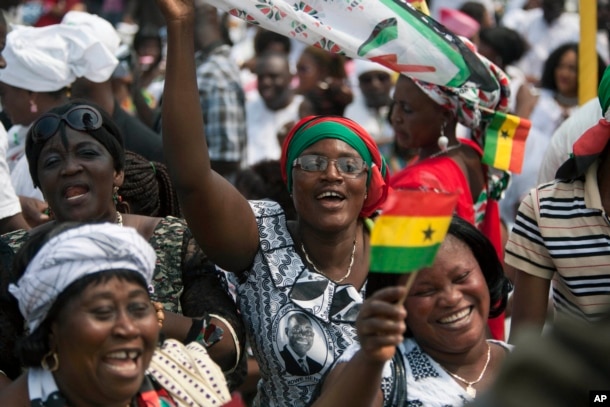A new survey conducted by the Center for Democratic Development (CDD) shows that a majority of Ghanaians believe the Electoral Commission of Ghana can administer free, peaceful and credible elections December 7.
Ghanaians will go to the polls that day to vote in presidential, parliamentary and local elections.
In an interview with VOA, Kojo Asante, senior research fellow at the CDD and part of the group that administered the survey, said more Ghanaians now have a positive perception of the electoral body and those who organize the elections than in the past.
However, the survey also found that some respondents in the country's northern region are concerned that violence could break out between the political parties after the electoral commission counts the votes.
Both the police and the electoral commission have outlined hot spots where they say violence is possible and where measures to ensure peaceful elections may be needed.
"We found that about close to a third of our respondents indicated a certain apprehension about the breakout of violence” after the results are announced, Asante said. The CDD took a closer look at where that apprehension was coming from and found that in the northern region, 53 percent of the responses feared violence, he added.
Fear 'in every region'
"What our findings show is that, yes, in every region, there are some people who express certain fear of postelection violence,” Asante said. But they were not able to determine whether those responses lined up with the hot spots that the commission and the national security task force on elections identified, he added.
Ghanaians, Asante said, expect the parties and the candidates who lose will use the courts to seek redress and dispute the outcome with evidence.

FILE - Supporters cheer during the inauguration ceremony for President John Mahama in Accra, Ghana, Jan. 7, 2013. The election for Ghana's next president will be held December 7.
The findings, he added, show that a majority of respondents reject violence and support peaceful demonstrations to protest election results. He says the respondents, however, are concerned that supporters of the parties could resort to violence.
Asante said prospective voters appear to have confidence in the electoral commission, a sharp improvement from the last nationwide survey.
The researchers measured "the EC's level of preparedness, which is basically not just the EC but also other national stakeholders, like the police, the army, the national peace council and so on,” he said.
“The EC story is one of good news, because when we did the Afrobarometer survey in 2014, the EC trust ratings were very low. They were in the 40s,” Asante said.
That was shortly after the New Patriotic Party (NPP) alleged massive voting irregularities in the December 2012 election and took the National Democratic Congress (NDC) to court to challenge the election results. Eight months later, in August 2013, the Supreme Court dismissed the case and upheld the results of the election.
“Now, that was a low point," Asante said.
"When we did the first round of polling in July [2016], the EC rating had moved to 63 percent. And in the current survey that we just did, it's moved to 73 percent,” he said. “So that's very positive, I think, in terms of the confidence reposed in the electoral commission.”
Vote manipulation
However, there are still concerns about vote manipulation, he said, and the EC could do more to educate the people about the electoral process.
Ghanaians do expect a peaceful election, he said, despite a clash this week between supporters of the opposition NPP and the ruling NDC. Supporters of the NPP had accused the NDC partisans of throwing stones and bottles at the house of their leader and presidential candidate. The NDC, for its part, accused the NPP of starting the trouble by attacking them during a peaceful walk. The police stepped in to prevent further violence.
"For us, one of the things that came out of the survey is that the trust rating for the army and the police has remained consistent and very high in both surveys,” Asante said. That means, he said, the army and the police would have the legitimacy to deal with violence or to prevent violence.
VOAnews.com

Comments